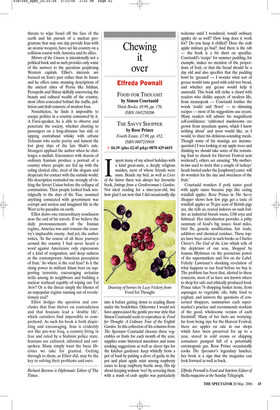The double life of a people
Richard Beeston
MIRRORS OF THE UNSEEN: JOURNEYS IN IRAN by Jason Elliot Picador, £16.99, pp. 416, ISBN 033048656X ✆ £13.59 (plus £2.45 p&p) 0870 429 6655 The crowd of bearded men looked and sounded as though they meant it, punching the air in unison and chanting the familiar slogans: ‘Death to America!’, ‘Death to Israel!’. A quarter of a century after the revolution that swept the Islamic regime to power the official message in Tehran had barely altered. America remained the ‘Great Satan’ and Britain, Iran’s traditional foe, still merited the title ‘little Satan’. But a chance encounter with one of the participants in this supposedly spontaneous, but evidently well-rehearsed, demonstration revealed a very different side to the country. ‘You are from England?’ he said, beaming. ‘You are welcome. My cousin lives in Manchester. You must come home and meet my family.’ Judging by Jason Elliot’s timely, perceptive and important travel book, the simple act of hospitality I was shown is typical of the people he discovered during his adventures. As he embarked by bus, taxi and sometimes on horseback to explore this ancient land, his encounters with modern Iranians expose a nation tired of war and revolution, eager for contact with the outside world and desperate for a normal life.
Understanding modern Iran is more than just a matter of academic interest in the affairs of a middle-sized country sandwiched between the Arab world and Central Asia. How we deal with Tehran in the coming months and years may well decide the fate of Iraq (where Iran’s Shia Muslim brethren are a majority), the destiny of the Middle East (where the Iranians support militant groups across the Arab world) and whether the West can resolve its struggle with modern Islam. As anyone involved in foreign policy will tell you, Iran matters.
All too often our perception has been shaped by the provocative statements and defiant actions of the current leadership, especially President Mahmoud Ahmadinejad. After eight short months in office he has succeeded in plunging his country into a state of permanent crisis with the West. His threats to wipe Israel off the face of the earth and his pursuit of a nuclear programme that may one day provide Iran with an atomic weapon, have set his country on a collision course with America and its allies.
Mirrors of the Unseen is intentionally not a political book and as such provides only some of the answers to the questions perplexing Western capitals. Elliot’s interests are focused on Iran’s past rather than its future and he offers some stunning descriptions of the ancient cities of Persia like Isfahan, Persepolis and Shiraz skilfully uncovering the beauty and cultural wealth of the country, most often concealed behind the traffic, pollution and drab concrete of modern Iran.
Nonetheless, he finds it impossible to escape politics in a country consumed by it. A Farsi-speaker, he is able to observe and penetrate the society, whether chatting to passengers on a long-distance bus ride or sipping contraband whisky with urbane Tehranis who recite poetry and lament the lost glory days of the late Shah’s rule. Strangers applaud the author when he challenges a mullah. Encounters with dozens of ordinary Iranians produce a portrait of a country where people are fed up with the ruling clerical elite, tired of the slogans and desperate for contact with the outside world. His description reminded me strongly of visiting the Soviet Union before the collapse of communism. Then people looked back nostalgically to the days of the Tsar, assumed anything connected with government was corrupt and useless and imagined life in the West to be paradise on earth.
Elliot draws one extraordinary conclusion near the end of his travels. If we believe the daily pronouncements of the Iranian regime, America was and remains the country’s implacable enemy. And yet, the author writes, ‘In the course of all these journeys around the country I had never heard a word against Americans; only expressions of a kind of resignation, and deep sadness at the contemporary American perception of Iran.’ So where is the real Iran? Is it the rising power in militant Islam bent on supporting terrorists, encouraging sectarian strife among its neighbours and building a nuclear warhead capable of wiping out Tel Aviv? Or is the threat simply the bluster of an unpopular regime running out of revolutionary zeal?
Elliot dodges the question and concludes that Iran thrives on contradiction and that Iranians lead a ‘double life’, which outsiders find impossible to comprehend. As such his book is both dispiriting and encouraging. Iran is evidently not like pre-war Iraq, a country living in fear and ruled by a Stalinist police state. Iranians are cultured, informed and outspoken. Many simply want the basic liberties we take for granted. Getting through to them, as Elliot did, may be the key to solving their problems and ours.



















































































 Previous page
Previous page